- Home
- Susan Howatch
The Shrouded Walls Page 3
The Shrouded Walls Read online
Page 3
“And the beautiful lady he referred to? Is she also a mere business acquaintance?”
He gave me such a long cool look that in the end I was the first to look away.
“I have been a widower ten years, Miss Fleury,” he said at last, and his voice was as cool as his expression. “As you are already so well acquainted with the ways of the world you will be well aware that once a man has become accustomed to female companionship he is loth to do without it later on. Shall we turn here and walk in another direction, or do you wish to go home yet?”
Tears pricked beneath my eyelids for some reason not easy to explain. I felt very young suddenly, and, what was worse, insecure and afraid. At that moment my betrothal seemed no longer a fortunate stroke of luck, a game which enabled me to parade among society at Vauxhall and display my future husband, but an exchange of freedom for restriction, of the familiar for the unknown.
It made no difference that I had already guessed he must have a mistress. The casual way he had not even bothered to deny the fact and his mockery of my desire to appear sophisticated were the aspects of his behavior which I found most hurtful. When I reached home at last I went straight to bed and tossed and turned with my tears till dawn.
The next morning he called with an enormous bouquet of flowers and was at his most courteous and charming. Even so I could not help wondering whether he had spent the night alone or whether he had visited his mistress instead.
We were married in the church of St. Mary-le-Strand less than a month after we had met and Alexander and Sir Charles Stowell acted as witnesses. It was a very quiet affair. My French godmother, an old friend of my mother’s, attended, and two or three of my childhood friends. Afterwards there was a wedding breakfast at my husband’s rented townhouse, and after it was over the carriage was waiting at the door to take us the twenty miles south into Surrey to the country house where it had been arranged that we should stay for a few days. The owner, an acquaintance of Axel’s was at that time in Bath with his family, and had given instructions that we were to treat the house as if it were our own.
My traveling habit consisted of a fur-trimmed redingote of levantine worn over a classic white muslin dress, and accompanied by a matching fur muff and snug warm boots to combat the chill of November. Axel had given me plenty of money so that I could have the clothes I pleased for the wedding and afterwards, and although time had been short I now had an adequate wardrobe for the occasion.
“You look very fine,” said Alexander almost shyly as he came forward to say goodbye to me. And then as he embraced me I could hear the anxiety in his voice as he said uncertainly: “You will write, won’t you? You won’t forget?”
“Of course I shan’t forget!” There was a lump in my throat. Suddenly I couldn’t bear to leave him, and hugged him fiercely to me with all my strength.
“I shall see you at Christmas,” he said, “when I am able to leave school for the holidays.”
“Yes.”
“It won’t be long. Just a few weeks.”
“Yes.” I disengaged myself and turned away before he could see how close I was to tears.
“You will be all right, won’t you?” he whispered as I turned from him.
“Of course!” I said with dignity, recognizing his craving for reassurance and not daring to acknowledge my own. “Why not?”
Axel was waiting a few paces away by the carriage. He had already said goodbye to Alexander. As I could sense they both disliked each other, I wasn’t surprised that their parting from one another had been very brief and formal.
I reached the carriage.
“You’re ready?” said Axel.
“Quite ready, thank you.”
He assisted me into the carriage and then climbed in after me. It was not until we were well out of London that I was sufficiently in control of myself even to look at my husband, let alone speak to him. Finally as we passed through Wandsworth I was able to say: “How fortunate that the weather should be so fine.”
“Yes,” he said, “indeed.”
I looked at him. His polite expression told me nothing, but I knew instinctively that he was well aware of my emotional battles and had carefully refrained from conversation to avoid giving me embarrassment. I suppose I should have been grateful to him for his perception and consideration, but I was not. I somehow resented the fact that he saw too much and understood too well, and I was angry.
We stopped at Epsom where we dined, and again at Leatherhead where we paused at the inn by the river to allow the grooms to attend to the horses. By the time we reached the village of Bookham and the mansion of Claybury Park it was dusk and I was feeling very tired.
The house seemed spacious and beautiful, even to my weary eyes, and the servants civil and attentive. Axel asked if I wanted any refreshment and when I refused told one of the servants to show me to my room.
A fire blazed in the grate and the lamp on the table illuminated the gracious furniture of a room of elegance and style. After glancing around with interest, I locked the door into the corridor and went over to examine another door on the far side of the room. As I suspected it led into another bedroom where Axel’s luggage had already been placed by his valet. After glancing at the heavy portmanteau, I closed the door and looked for the key to lock that as well, but there was no key to be seen.
I decided not to summon my maid. She would be as tired as I was, and I could manage well enough on my own. Undressing as quickly as I was able, I loosened my hair, brushed it out and dowsed the lamp. The flames still flickered in the grate and I lay awake a long time watching them and listening for any hint of Axel’s arrival in the room beyond. Time passed. My eyelids grew heavy and my thoughts became more detached. I thought fleetingly and without distaste of my brief acquaintance with Axel Brandson and the quiet unobtrusive wedding. I still could not entirely believe that I was a married woman and that Axel was my husband. It was a pity he was so old and seemed to have so little to say to me. It was true he was courteous and often charming but I had always had the impression that he was making an effort to appear so. I probably seemed a mere child to him, and he had been bored.
I wondered what his mistress was like, and was suddenly determined to outshine her. “He shall not be bored by me!” I thought furiously. “He shall not!” I hazily began to imagine passionate love scenes throbbing with romance and tenderness, a state of ecstasy unrivaled by anything I had ever experienced before. After all, as I reasoned, such a state must be enjoyable or people would not spend so much time thinking of so little else.
My eyes closed. I was warm and luxuriously comfortable. I was just about to drift into sleep when I thought of Alexander and wondered if he was thinking of me.
The loneliness hit me in a hideous wave, driving away the comforting oblivion of sleep and making my throat ache with the longing to cry. I stared for a long time at the dying embers in the grate, and then at last I heard movements from Axel’s room and I was conscious of an enormous relief. My pride alone restrained me from running to him in my desire to shut out the loneliness and seek comfort from the only person I could now turn to.
I waited. Gradually the sounds ceased and there was silence. I went on waiting, my limbs stiff with tension, but he did not come. I waited until the fire had died in the grate and then I turned and buried my face in my pillow and wept myself to sleep.
The next morning it was raining. My maid, Marie-Claire, helped me dress and arranged my hair but I was disinclined to talk and I could sense she was disappointed. When I was ready I went downstairs, uncertain of my way around this strange mansion, and was directed by a footman to a small breakfast room where I drank a cup of tea and ate a biscuit. Afterwards I wandered through the rooms listlessly and stared at the view from the windows of the long gallery but the rain had brought mist to the valley and it was difficult to see much. I wished that it could have been fine for the grounds looked interesting and it might have been pleasant to wander in them, but it was much too wet to go ou
t.
In the end I went to the library, found one of Jane Austen’s novels and tried to read, but the placid events which befell her characters soon bored me and I turned instead to Fielding and Defoe. There was even a copy of Moll Flanders which my mother had never let me read, so the morning passed unexpectedly quickly.
I saw nothing of Axel until dinner was served at three. I was very cool towards him, but he seemed not to notice and was as polite—and as remote—as ever. Afterwards I left him alone with his port and went to the drawing room to write a letter to Alexander. I described the house in great detail and told him all about Moll Flanders.
I felt better after that.
Presently it was time to go to bed and I took a great deal more trouble with my appearance and wore my best nightgown which weariness had made me ignore the night before. Once in bed I tried to stay awake for as long as possible but sleep claimed me before I was even aware of its approach and when I awoke the night was far advanced and I was still alone.
I think Marie-Claire was a little hurt that I should be so morose and silent for a second morning in succession, but I made no effort to talk to her and eventually she withdrew sulking while I went down to breakfast. Fortunately it was fine and I spent the morning wandering around the grounds, exploring the lawns and yew walks, the vegetable garden and orangery, the woods, the stream, and even the ruined temple which had been erected a generation earlier to ornament the grounds.
Axel spent the morning writing letters. I had gone into the library to return Moll Flanders to its shelf and he had already been seated at the desk with pen and ink. We had said good morning to each other and exchanged a few polite words. Later when I returned to the library before dinner to look for another book to read I found that he had gone but the letters lay on the desk where he had left them. I glanced at the addresses. Three were marked for Vienna, but one was addressed to “James Sherman Esquire, Sherman, Shepherd and Sherman, Solicitors, 12 Mermaid Street, Rye, Sussex”, and the last to “Vere Brandson Esquire, Haraldsdyke, near Rye, Sussex.” I stared at this last letter for some time. Haraldsdyke, I knew, was the name of the estate and house which Axel had inherited from his father, my future home where I would be mistress. Vere Brandson was the second son of Axel’s father’s second marriage. The eldest son, Rodric, Axel had told me, had died shortly after his father as the result of an accident. The youngest son, a boy of nineteen whom Axel had scarcely referred to at all, was called Edwin.
I was still thinking of Axel’s English relations when I went down to dinner and was tempted to ask him more about them, but he seemed disinclined to conversation and apart from inquiring politely how I had spent my day and embarking on a discussion of landscape gardening, he appeared anxious to eat in silence. I was therefore a little surprised when he joined me in the drawing room later and suggested that I played for him on the spinet for a while.
I have never been fond of the spinet but I play passably well and sing better than I play. He seem pleased at my ability, and as I naturally enjoyed his compliments I offered to play a piece on the harp. There is only one piece I can play well on the harp, and I played it. To my satisfaction he asked me to play more but I pretended to be too modest, and gracefully escaped the risk of spoiling the excellent impression I had created.
“I’m delighted I have such an accomplished wife,” he said and his smile was so charming that he seemed handsome to me for the first time. It was also the first reference he had made to our new legal relationship with one another. “I had no idea that you were so musical.”
“There was no spinet in the rooms you rented for Alexander and myself,” I said lightly. “I had no chance to play to you before.”
“True.” He smiled at me again. “You speak French, of course?”
“Yes.”
“Perhaps you would read me some Moliere if you were not too tired? There’s nothing I like better than to hear French spoke with a perfect accent.”
I was reminded again of his foreign background. No true Englishman enjoyed listening to the tongue of the great national enemy Bonaparte.
I read to him in French for half an hour. I was perfectly at ease in the language, as my mother and I had always spoken French to one another and I had had a French maid from an early age. Afterwards he again seemed pleased and we talked for a while of French literature and history.
We had a light supper by candlelight at last, and then he said that he was sure I was tired and that if I wished to retire to bed he would quite understand.
I could not decide whether he was being genuinely considerate or whether he merely wished to dismiss me. However, I went upstairs to my room, conscious of a feeling of disappointment, and sat for a long while before my mirror frowning at my reflection in despondency. Finally, trying to stave off my increasing loneliness I summoned Marie-Claire and made an elaborate toilette before preparing myself for the long hours of the night which lay ahead.
I had not been in bed more than ten minutes before I heard movements in Axel’s room. There was the faint sound of voices as he dismissed his valet, and then later after more vague sounds there was silence. I was just straining my ears to decide whether or not he had gone to bed, when the communicating door opened and he came into the room.
I half-sat up in my surprise and at the same moment he turned to look at me. The flame flickered on the candlestick in his hand and was reflected in the darkness of his eyes so that their expression was again hidden from me.
I sank back upon the pillows.
For a moment I thought he was going to speak but he did not. He set the candlestick down on the table by the side of the bed and then gently snuffed it out so that we were in darkness. I heard rather than saw him discard his dressing gown; suddenly he was beside me between the sheets and I could feel his quick hot breath against my cheek.
I relaxed happily in the supreme bliss of my ignorance. I had thought myself so sophisticated in knowing all about the passion and ecstasy and fulfillment of the act of love. No one had ever told me that this same act could also be painful, embarrassing and repulsive.
Later after he had gone I curled myself up into a ball as if to ward off the horror of memory, and for the third night in succession I cried myself to sleep.
It was raining again the next morning and I was unable to walk in the grounds. After breakfast I took another of Miss Austen’s books from the library and hid myself in the smallest morning room while I read it. Today Miss Austen’s work was easy to read, her situations no longer mundane, her characters no longer boring but reassuring in their normality. I no longer wanted to read Gothic romances or any novel such as Moll Flanders, and Miss Austen’s world of vicarage and village and social proprieties was soothing and comforting to my mind.
Axel found me at noon. He was wearing riding clothes, and I noticed for the first time then that although it was still gray outside the rain had stopped.
“I wondered where you were,” he said. “I couldn’t find you.”
I knew not what to say. Presently he closed the door behind him and crossed the floor slowly to my couch.
“I doubt whether there’s much sense in delaying our departure for Haraldsdyke much longer,” he said as I fingered the leather binding of the book in my hands. “Today is Saturday. Unless you object, I thought we might leave on Monday morning. If the roads are not too disgraceful we may reach Rye on Wednesday night.”
“As you wish.”
He was silent. Presently I felt his cool fingers against my cheek, but I did not look up; I was steeling myself against any reference he might make to the distasteful memory which lay between us, but in the end all he said was: “There’s no need to look as if you think the company of the opposite sex is a sadly overrated commodity. Matters will improve in time.” And then he was gone before I could attempt to reply, and I was alone once more with my book in the silent room.
I wondered when “in time” would be, but evidently it was not to be beneath the roof of Claybury Park
. That night and the following night the door between our bedrooms remained closed, and on Monday we left the lonely peace of that beautiful house in Surrey for the mists of the Romney Marsh and the shrouded walls of Haraldsdyke.
Two
“Perhaps I should tell you more about my family,” Axel said as we dined together on Monday night at Sevenoaks.
Outside it was dark, but where we sat in the private sitting room accorded to us by the innkeeper, a huge fire blazed on the hearth and the room was warm and comfortable. After the tediousness of the long hours of travel it was a relief to escape from the jolting post-chaise and the chill of the damp weather.
“Yes,” I said uncertainly, “I would like to hear more about your family. You only described them so briefly before.” I was uncertain because I was by no means sure that this was the answer he wanted. At the same time I was also annoyed that I should be so nervous with him that a single chance remark should throw me instantly into a state of confusion.
I began to examine a scrap of roast beef with meticulous care, but when he next spoke he seemed unaware of my embarrassment.
“My father died last Christmas Eve, as I’ve already told you,” he said. “He was a man of strong personality, typical of many an English gentleman who belonged to the last century rather than to this one. He was a staunch Tory, a confirmed conservative, a believer in letting his land be farmed the way it had been farmed since the Conquest, violently anti-Bonaparte and anti-European. It always amazed me that he of all people could have brought himself to marry a foreigner, but maybe he was more liberal when he was younger. Or maybe his experiences with my mother contributed to his later prejudices against foreigners. They certainly weren’t happily married. She left him even before I was born, but fortunately had the means to set up an establishment of her own in Vienna where I entered the world a few months afterwards. Following my birth she never fully regained her health and in fact died five years later. After that I was brought up by her elder brother, my uncle, who was later appointed to the Court of St. James’s on some minor diplomatic mission in the days when the Emperor was still Holy Roman Emperor, and not merely Emperor of Austria as he is today. I went with him to London, and my uncle, who had always found me rather an intrusion on the privacy and freedom of his bachelor existence, arranged for me to meet my father in the hope that my father would perhaps relieve him of his responsibilities where I was concerned.

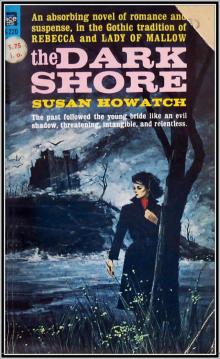 The Dark Shore
The Dark Shore Sins of the Fathers
Sins of the Fathers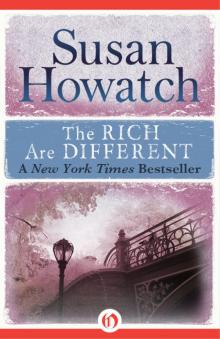 The Rich Are Different
The Rich Are Different The Shrouded Walls
The Shrouded Walls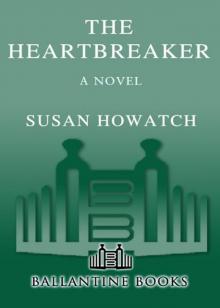 The Heartbreaker
The Heartbreaker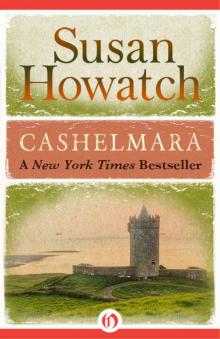 Cashelmara
Cashelmara The Wonder Worker
The Wonder Worker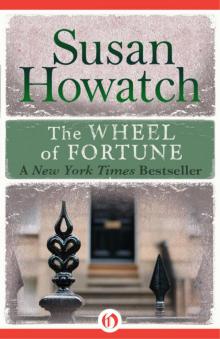 The Wheel of Fortune
The Wheel of Fortune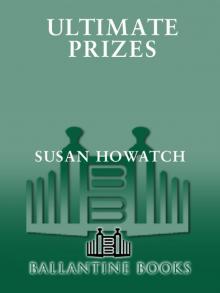 Ultimate Prizes
Ultimate Prizes Penmarric
Penmarric The High Flyer
The High Flyer